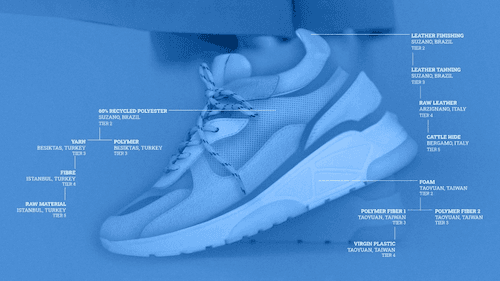Adidas Does Transparency
Contributor
Carli Gernot, Content Development Specialist

What’s Up
Adidas is one of the first major brands to trial TrusTrace Material Traceability & Compliance — a blockchain sustainability verification solution for fashion and apparel.
Stockholm-based Software-as-a-Service (SaaS) platform TrusTrace launched the software solution on Monday, March 14, and adidas is making use of the platform to enable real-time tracking along its supply chain. It’s meant to fight against misinformation and improve transparency and traceability in the fashion industry.
The Material Traceability & Compliance tool aggregates data from various sources (including Higg Material Sustainability Index) and coordinates compliance with a range of criteria. It can track the calculations of materials waste, a product’s origin, and provide proof for sustainability claims. By using the software, adidas can display the brand’s compliance with national and international standards and regulations.
TrusTrace compiles the necessary data from sources on behalf of companies using its open-source artificial intelligence, blockchain, and bots, which allow near-instant updates for garment details and information.
“As part of its commitment to sustainability, adidas has worked with TrusTrace to gain more visibility into our complete supply chain down to the materials level,” said Katja Schreiber, senior vice president of sustainability at adidas, in the brand’s announcement.
What It Means
Consumers have lots of complications in their lives — rising gas prices, inflation, supply chain disruption — oh my! As a result, we’re seeing how nearly half of US adults want brands to be more up front about how things are made. According to GWI’s 2021 Sustainable Shopping Habits report, 40% of US adults said they want brands to be more transparent about how products are made, with this proportion going up to 44% for Gen Z and 42% for Millennials.
Often, the how part of that equation lines up with increased desire for sustainable products, particularly in fashion. GWI also found that, in 2021, nearly 2 in 3 fashion-conscious consumers said they would rather pay more for an eco-friendly product.
Because shoppers are only getting more savvy and research-minded, businesses need to find ways to display why their green claims are to be believed: 71% of consumers said they don’t believe brands will deliver on their promises, as per Havas Media Group’s 2021 Meaningful Brands report.
Brands need to manage consumer expectations and deliver on eco-responsibility commitments, but also do more to reassure consumer ethical concerns. Big brands like Nike and adidas have come under fire for exploitative labor practices — and tools like Materials Traceability & Compliance provide the information shoppers need to make an informed decision.
In the midst of global greenwashing and challenges with unsubstantiated claims, brands and regulators are moving quickly to instill confidence among consumers that products are, indeed, as sustainable as they claim to be. Brands that want to establish near real-time traceability at the lot level by mapping the movement of raw materials to finished goods, and to automatically calculate the sustainability metrics of those goods, now have a proven solution in TrusTrace Certified Material Compliance,” - Shameek Ghosh, CEO of TrusTrace, in a press release, 03.14.22
Businesses across categories must boost transparency and follow through. Once declarations of eco-responsibility and ethical production practices are made, the work of proving how those promises are being kept begins. Smart tech and AI will be key for brands looking to display local credentials, sustainability benchmarks, ethical operations. As transparency becomes more of a given for consumers — and more companies make use of verification tools — brands may also need to extend this open-book approach to hiring practices, pay-gap data, and corporate ideology.